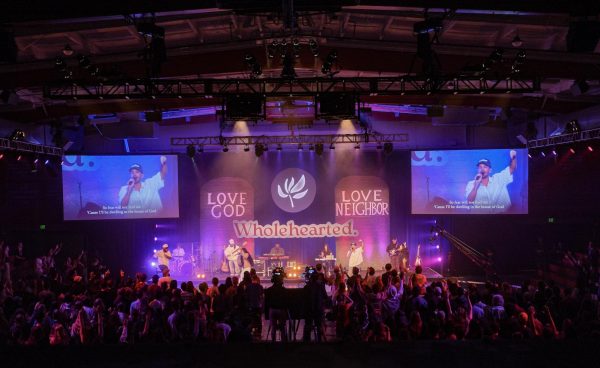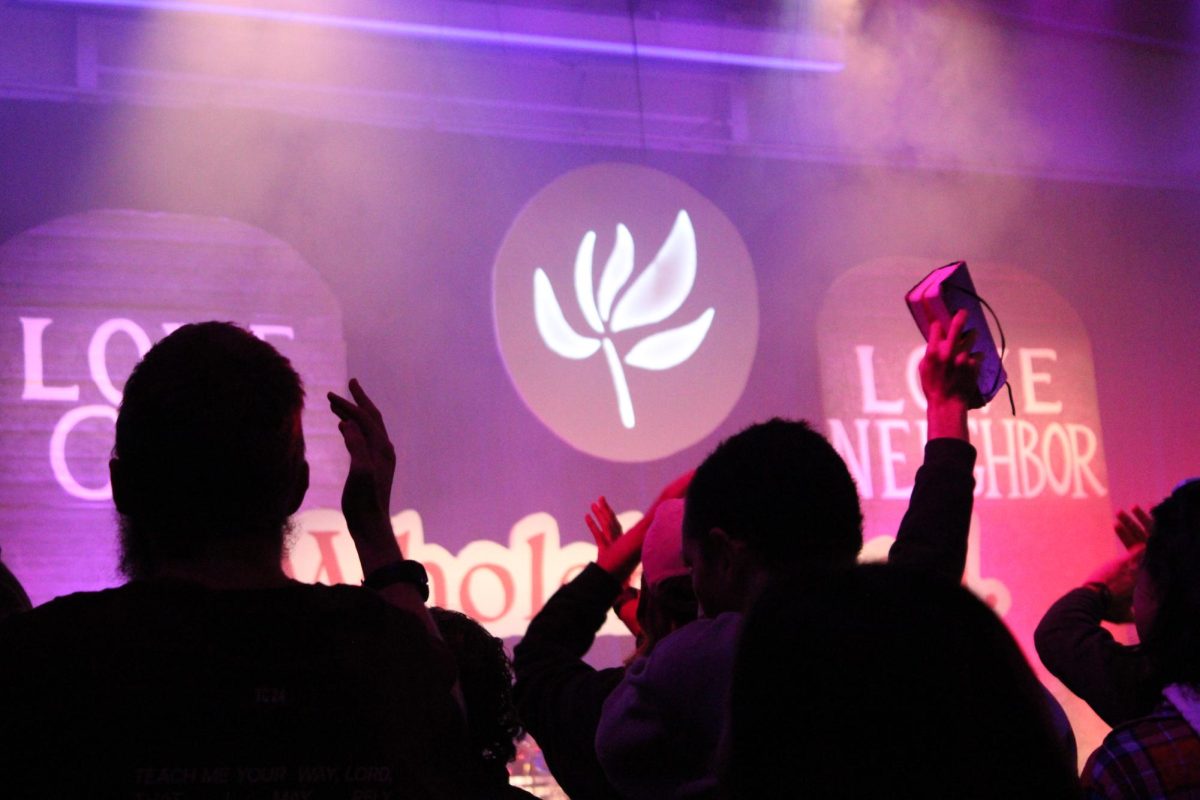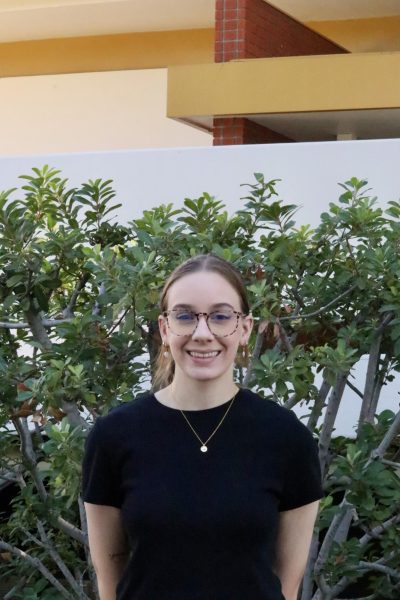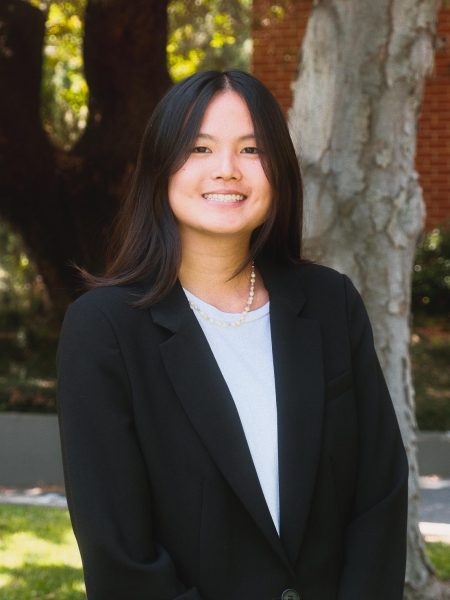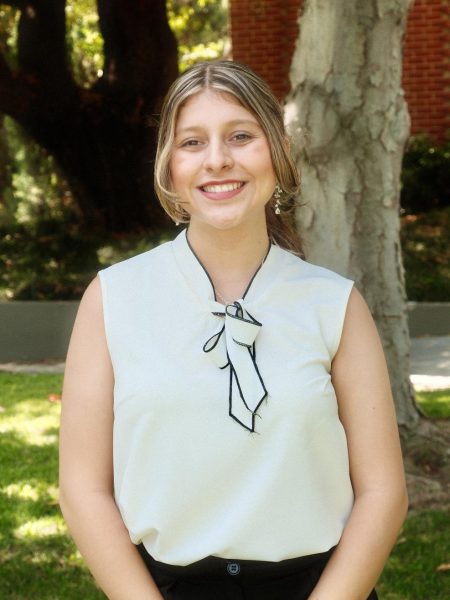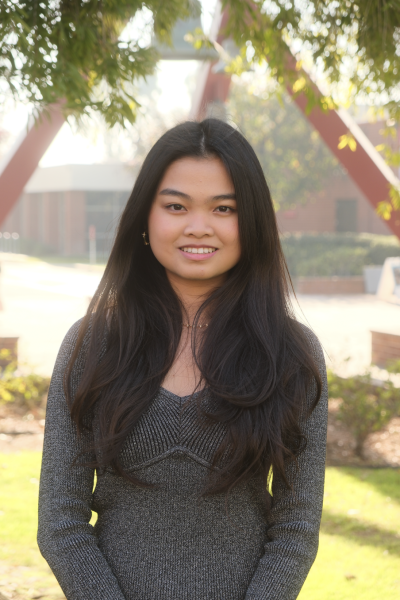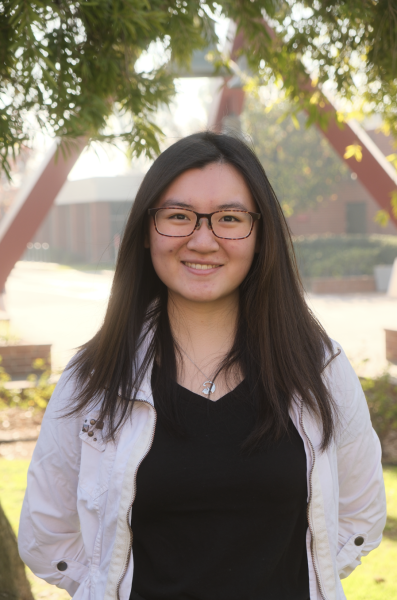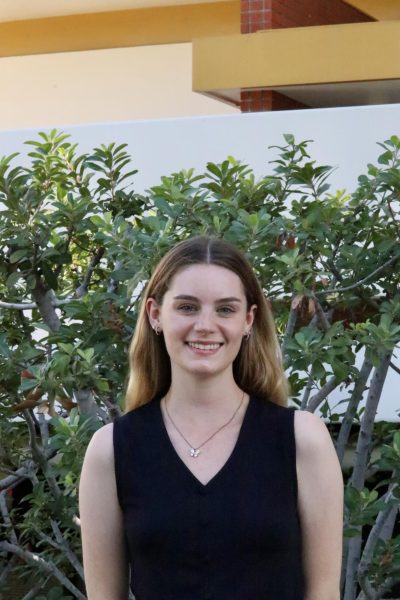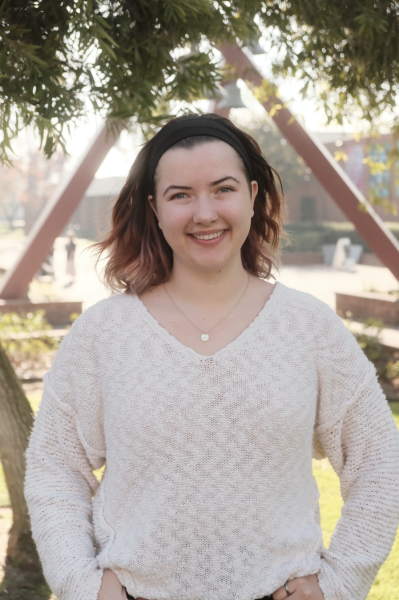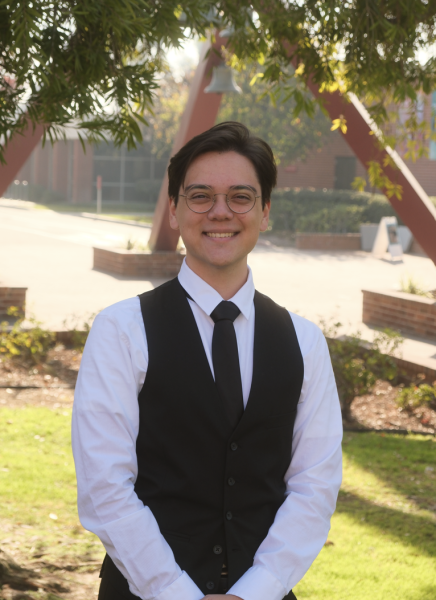Early on the morning of Oct. 9, hundreds of students lined up outside Chase Gymnasium, eagerly awaiting the start of Biola’s 89th Torrey Memorial Bible Conference. This year’s theme — Wholehearted — delves into how we Christians can worship God with our whole being and our undivided attention. Keynote speakers comprising Biola faculty and guest speakers from across the country dive into topics such as grief, political conflict and same-sex attraction, with Psalm 86:11 at the core.
DAY ONE, SESSION ONE: FOUR THINGS CHRISTIANS MUST RECLAIM
The first session opened with a time of worship led by the band One Voice. President Barry Corey said a few words before welcoming speaker Rebecca McLaughlin to the stage. McLaughlin has a PhD from Cambridge University and a theology degree from Oak Hill College in London.
McLaughlin’s message was titled “Four Things Christians Must Reclaim.” She discussed what it means for Christians to reclaim diversity, the university, morality and sexuality.
RECLAIMING DIVERSITY
McLaughlin told a story of a black African Christian who was told to leave by two white British police officers while preaching on the streets of London. When the officers told him that people didn’t want to listen to his message, the man replied, “You will listen when you are dead.”
McLaughlin used this story as a reminder that Christianity is far more diverse than people realize, stretching far beyond white Westerners. She stated that Christianity is currently the largest global religion, with about 31% of the world identifying as Christian. McLaughlin urged the audience to reclaim diversity in Christianity because it is the most multiracial, multicultural and multiethnic movement in all of history.
RECLAIMING UNIVERSITY
McLaughlin stated that people believe secular universities will become more modern by emphasizing science over religion in education. However, McLaughlin asserted that secular universities are not where faith dies but grows. She spoke of her friend Rachel Gilson, who became a Christian when she was at Yale University as an undergraduate. McLaughlin stated that she has many friends who came to Jesus during or after attending leading secular universities.
RECLAIMING MORALITY
McLaughlin recalled a time when her then-atheist friend Sarah Irving-Stonebraker attended a lecture by Peter Singer at Oxford University. Singer declared that if someone doesn’t believe in God, they can’t borrow Christianity’s ethics and claim that they are secular. He suggested we should evaluate beings by their capacities rather than assuming all humans are fundamentally equal simply because they’re human. However, Irving-Stonebraker did believe that all human beings were fundamentally equal, and she realized these moral beliefs didn’t align with her atheism.
“[Jesus] changed the moral world in the last 2,000 years to where we do believe in universal equality, regardless of your status, regardless of our wealth, regardless of your natural abilities or racial background or ethnic heritage,” McLaughlin said.
RECLAIMING SEXUALITY
In the Old Testament, God created man and woman to be united as one flesh. The Bible also illustrates that Jesus is “married” to his church and earthly marriages are meant to mirror that relationship. McLaughlin emphasized that marriage ultimately points us to Christ.
“We’ve made marriage into the destination when it’s meant to be a signpost. We’ve talked as if Christian marriage is the goal of everybody’s life and raising children,” McLaughlin said.
She highlighted that brotherly and sisterly love is just as important as romantic love. Building strong relationships with friends and family through brotherly and sisterly love provides a gateway into later developing romantic relationships that feed into marriage and parenting.
McLaughlin also shared her own struggle with same-sex attraction throughout her life. She vulnerably told the audience that if she had not been a Christian, she probably would’ve ended up married to a woman. She has lived without a same-sex relationship her whole life because she recognized that the one relationship she truly could not live without was one with Jesus.
“So as we go out into a hurting world, let’s reclaim diversity, let’s reclaim the university, let’s reclaim morality and let’s reclaim sexuality,” McLaughlin said. “[Jesus] is our modern world’s best hope.”
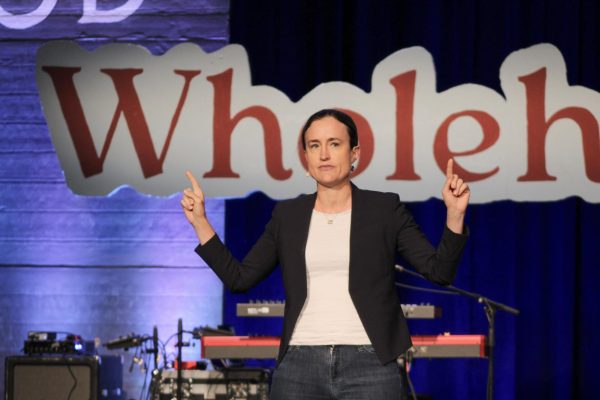
DAY ONE, SESSION TWO: THE GOSPEL AND SAME-SEX ATTRACTION
After One Voice opened the evening, Rachel Gilson began the second session with her topic “The Gospel and Same-Sex Attraction.” Gilson received a Masters of Divinity from Gordon-Conwell Theological Seminary and is the author of “Born Again This Way: Coming Out, Coming to Faith and What Comes Next” and “Parenting Without Panic in an LGBT Affirming World: Discipling our Kids with Jesus’ Truth and Love.” She is currently pursuing a doctorate in public theology from Southeastern Baptist Theological Seminary. She also serves on the leadership team of Cru, a Christian interdenominational organization.
Gilson shared about her life before becoming a Christian. In middle school, she realized she was an atheist because she assumed Christians were too lazy or stupid to think reasonably. She also realized she was attracted to the same sex, feeling the same way about girls as her female friends did with boys at school. When Gilson moved to college, many things changed. She remembered that she built her life on two things: her intellectual rigor and her girlfriend. After they broke up, however, she went through an identity crisis, especially because she was in a Western philosophy class featuring Descartes, prompting her to think more about God’s existence. After extensive research and interactions with Christians, she concluded that Christianity did not support same-sex relationships. She read C.S. Lewis’ “Mere Christianity” and was struck with a realization.
“I do not remember what chapter I was in, what page I was on – anything like that – but while I was reading this book, I was suddenly overwhelmed with the reality: God exists,” Gilson said. “It was like I was sensing the edges of his holiness, even though I didn’t really understand that vocabulary word, and all I felt was fear because He had met me.”
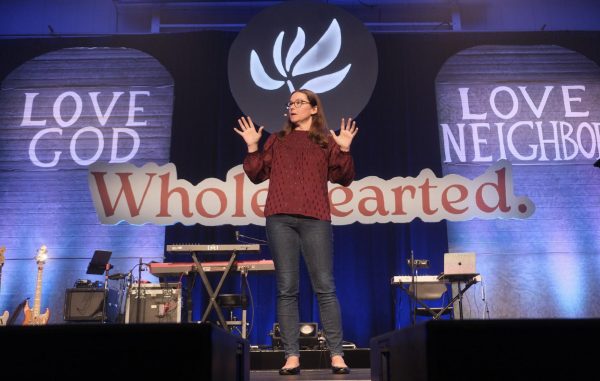
After becoming a Christian, she realized many other things about herself and her faith. Gilson shared how the Holy Spirit helped her understand that she had to run toward Jesus and that she couldn’t pretend Christianity wasn’t true just because it was inconvenient for her lifestyle. She experienced joy from her newfound life as a Christian, but her same-sex attraction remained a constant struggle.
“There was a time where I really felt the Lord pressing on me like, ‘If you’re only willing to obey me when you both understand and agree with what I’ve said, maybe you’re not really worshiping me as God. Maybe you’re more interested in following yourself,’” Gilson said. “As I looked at the data of what Jesus accomplished, I realized everything I needed to see: that he is for me. So even if I don’t exactly understand why [God’s] saying something, I know it’s not arbitrary or cruel.”
She reminded students that God will ask everyone for risky obedience involving the sacrifices of things central in our lives, whether it’s same-sex relationships or some other struggle. Gilson exhorted students to have wholehearted faith by connecting to God for themselves and not building their faith off others’ testimonies.
DAY TWO, SESSION THREE: TRIP LEE
Day two of the Torrey Conference began with a session featuring Christian rapper and singer Trip Lee.
Lee spoke of worshiping God when we are in circumstances that are not ideal.
“When have you ever thought yourself to be weak?” Lee asked.
Lee asserted that living a life where strength is simply a facade leads to despair. He explained that true strength comes from embracing our weakness, as Paul stated in 2 Corinthians 12:7-10.
Lee stated that weakness keeps people humble — it prevents them from developing inflated views of themselves in front of others or God. Secondly, weakness makes people dependent on God. Finally, weakness makes people strong because God shows his power through human weakness.
God’s strength is what enables individuals to endure and take heart during difficult situations. Jesus’ submission to weakness at the cross exemplifies this.
“It’s true, strength comes through weakness. And I want to remind you, that I know that people will think of particular weaknesses, or there are weaknesses in the season that’s on the way. And I want you to know this, your weakness does not push Jesus away,” Lee said. “Your weakness is one of the ways that Jesus is drawing you closer to him. And there is a lot more joy in making the strength of an all-powerful, always strong God who can never be weak than make it on your own strength that cannot land.”
Session three ended with worship by One Voice.
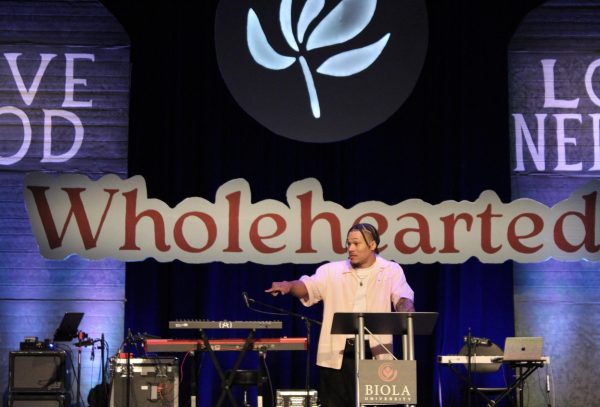
DAY TWO, SESSION FOUR: NAVIGATING DIFFICULT CONVERSATIONS DOCUMENTARY AND PANEL
A Christian, a Jew and a Muslim walked into Biola University for session four. Tim Muelhoff, professor of communication and a director of the Winsome Conviction Project; Simon Greer, a founder of the Winsome Conviction Project and a Jewish leader and activist; and Saad Soliman, a Muslim entrepreneur and justice reform advocate, participated in a panel discussion on bridging religious and cultural divides in a polarized world, using a documentary of their trip to Israel. The session ended with a time for Q&A.
Greer and Soliman crossed paths at a Winsome Conviction Project event, carrying contrasting, even conflicting, backgrounds.
Greer, raised in a far-left Jewish community, once worked in a career that deeply polarized society before realizing his error and turning right around. Soliman, a born-and-raised Muslim from New York, was once incarcerated for 15 years before becoming an entrepreneur and eventually securing a position in the US Department of Justice. Furthermore, Greer’s uncle had proudly served in the Israeli Defense Forces (IDF), capturing an Egyptian tank in a conflict, while three of Soliman’s uncles that served in the Egyptian military were killed by the IDF in that same conflict.
A generation ago, their uncles were trying to kill each other; now, Greer and Soliman are building a bridge. Currently, Muelhoff, Greer and Soliman seek to encourage people to love those with vastly different lives, values and history through the Winsome Conviction Project.
“We can’t transform a nation by tolerating other people but by loving other people,” Greer said.
The panelists showed clips of their February 2024 trip to Israel, demonstrating through those poignant scenes how people of different faiths can share in each other’s traditions, joys and pains. As they visited the West Bank’s Tekoa settlement, the Wailing Wall, the Mount of Olives, the Nova Festival site and more, they found opportunity to honestly and passionately bring their deepest convictions to the table. Together, they mourned over the tragedy of the Nova Festival, participated in Jewish traditional prayer and reflected on deep-seated religious convictions.
The panel encouraged students to not shy away from their convictions, emphasizing that it might actually offend people to not be able to tell them their deepest convictions for convenience’s sake.
“There is no statute of limitation to have the hard, deep conversation that matters,” Greer said.
During the Q&A, Greer, Soliman and Muelhoff continued encouraging students to make the change and initiate the difficult conversations. It is up to the individual to have conversations with their neighbors, to love over division and fundamental disagreements, whether religious, political or otherwise.
“Change feels like it’s impossible until it happens, and then [it feels] like it was always inevitable,” Soliman said. “We’re stuck in community, so we’re going to find a way forward.”
Greer stated that Christians have a unique opportunity to bring the love of Christ into these conversations.
“Muslims and Jews aren’t going to bring it — only you can. If you are an evangelical Christian, you get the say and action and opportunities to say that this is love, only you can bring it and not others,” Greer said. “It’s been a lonely year for Jews in America, and I’m here looking for friends.”
Likewise, Soliman encouraged the students to blaze the trail for growth.
“You are the anchors, don’t take this responsibility lightly, and you got supporters like us,” Soliman said.
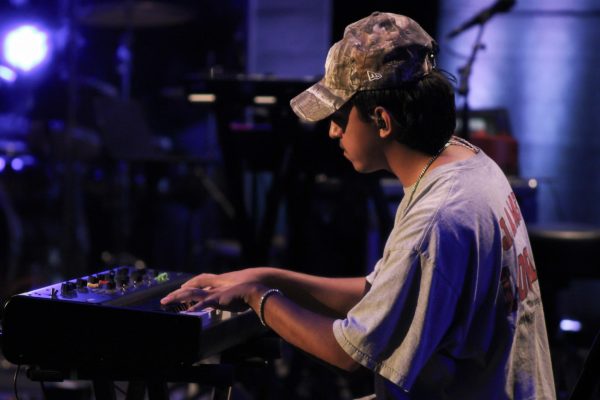
DAY TWO, SESSION FIVE: WORSHIP THROUGH STORY AND SONG
Day two of the conference closed with sTorrey Slam, featuring nine speakers that shared their stories as a form of worship. Alex Rocha, a spiritual formation major, accompanied these stories by performing song interpretations on keyboard.
“DRAGGIN’ ANCHOR” — MARK MUHA
A week after graduating college, Mark Muha, vice president of Student Development, packed up and bought a plane ticket for Alaska to start “living the dream.” He worked on a salmon boat in a fishing village 200 miles southwest of Kodiak Island. Yet while Muha learned many skills, he quickly realized how alone he felt. Facing the turbulent and biting cold waves of the Alaskan waters, Muha felt weighed down by misery with little faith to sustain him. But one day, in the midst of a storm, he looked up and saw a seagull, flying determinedly despite the fierceness of the winds and sea spray. Muha stood at the railing of the boat, watching the seagull and embracing all of nature — and he, too, found strength to “fly.”
“MY BENCH” — DAVID VAZQUEZ
In January 2017, David Vazquez, vice president of University Advancement, was suddenly struck with the possibility of a life-altering medical diagnosis. But while all the tests returned negative, he found himself struggling through a different life-changing issue: anxiety. Caught in a deepening, spiraling pit of “what ifs,” Vazquez suffered sleepless nights, restlessness and the inability to enjoy time with his wife. He was lost in his anxiety until, one day, he ventured over to a quiet Catholic retreat center. There, sitting on a bench at dawn, he read God’s word and saw David look to the Lord as the rock higher than all things in Psalm 61. And there, he rediscovered his peace.
“BEAUTIFUL THINGS” — JILL ROGERS
Jill Rogers, a student in the Institute of Spiritual Formation and Soul Care, recalled how her father, husband and two sons each struggled through various life-threatening health conditions. Afraid for the four most precious men in her life, Rogers experienced sleepless nights and tearful breakdowns, barely hanging on even as she read her Bible. When she began Ecclesiastes, she was at her lowest point. Yet one day, a radio preacher spoke of two kingdoms in Ecclesiastes: the kingdom under the sun, where all is vanity; and the kingdom under the heavens, where everything has its time. Then Rogers heard God speak to her.
“It was as if the Father scooped this pile of Jill off the floor, held me up with his arm, and he pointed out; he said, ‘Jill, I am going to make heart failure beautiful. I’m going to make brain tumor beautiful, I’m going to make death beautiful,’” Rogers recalled. “‘I promise, because that’s what I do. I make beautiful things.’”
“CULTURAL TO WHOLEHEARTED” — VIVIAN MABUNI
Vivian Mabuni, an author and podcast host, journeyed from cultural Buddhism to a life of faith in Jesus. It began when she noticed how a friend in her math class suddenly seemed to glow one day.
“I looked at her, saying, ‘What happened to you? Did you become a vegetarian?’“ Mabuni said. “She goes, ‘No, I began a personal relationship with Jesus Christ.’“
Mabuni later also pledged her life to Jesus. She struggled with her journey, however, feeling like her life was still the same as before. The one day, her dad suddenly decided the family would move to Hong Kong before her senior year of high school. Mabuni was furious at God. She raged against him in prayer, yet afterwards, in a moment of quiet, Mabuni prayed that God would give her a much-needed Christian community.
”If you do that, I will give you everything. I’ll hold nothing back,” Mabuni said.
God answered her faithfully. From that day, Mabuni gave her everything to God.
“GRIEVE. BREATHE. RECEIVE.” — SPENCER GREEN
Spencer Green, director of Housing and Residence Life, saw his life thrown upside down for three long years. He struggled through problem after problem, from harsh illness under COVID-19, to kidney stones, to his infant son’s near-death experience, to a mass in his thyroid. Green eventually went to therapy, and at this time he remembered his baptism at 13 years old. He recalled declaring Christ as his Savior in the morning and later watching porn and masturbating. Mortified, Green thought he “lost his admissions ticket to heaven,” believing that only by doing good could he be right with God. Suddenly he realized that there was nothing he could do to earn God’s love, but that God remained faithful and constant all his life despite it all.
“On September 10, 2023, I felt the sweet redemptive love of God when I was baptized again,” Green said. “I was done believing that I could earn his love. I wanted to be a wholehearted Child of God.”
“THE JOY OF SERVING” — KIMBERLY EDWARDS
Kimberly Edwards, director of Student Enrichment and Intercultural Development (SEID), had a well-paying job right out of college. She thought she would be able to live life to the fullest. But after taking a second job to pay off all her bills and student loans, she began feeling miserable, and joy slowly left her life. Yet as she took on another job to work respicare at a homeless shelter, she saw and wondered at the sheer joy in the faces of these homeless children. How could they have such light in their eyes? Edwards realized that she was living life in self-pity and self-centeredness. She found that when she served, she was inviting joy back into her life. With the help of the Holy Spirit, her day-to-day life became joyful once more as she recommitted herself to serving others.
“CAN I GET A SANDWICH?” — DANNY ROH
17 years ago, Danny Roh, the ministry and networking lead for the Talbot School of Theology, landed his very first full-time job as a pastor for a Korean church. Lost in the excitement of setting up his new office, he didn’t get his lunch until more than an hour past his usual lunch time. He hurried to a Subway, intending to just grab his sandwich and go when a woman stopped him to ask if he could buy her a sandwich. At that moment, Roh was split between either refusing and ignoring her or accepting her request. Knowing the Christian thing to do, he reluctantly bought her a sandwich. Come Sunday, he was struck to see the woman at church. It left him wondering, what if he ignored her that day? And Roh recalled Jesus’ words in Matthew 25:40, “Truly I tell you, whatever you did for one of the least of these brothers and sisters of mine, you did for me.”
“DOUBLE FISTED FAITH” — ANNA SINCLAIR
Anna Sinclair, professor of public relations, was born without her right forearm and hand. She hid her “little arm” under a prosthetic, but when she was 26, she no longer could do that without causing herself excruciating pain. Afraid of not fitting in, Sinclair was stuck in a dilemma: should she show her true arm, or force herself to keep wearing the prosthetic? She cried to God about this, and she realized a great truth — that she was “fearfully and wonderfully made” by a God who loved her. She realized that God made her intentionally unique; she could not remain ashamed. Sinclair took off her prosthetic arm before all the conference attendees.
“BROKEN PIECES” — KRISTEN
Kristen suffered abuse from both her parents and heard derogatory names thrown her way. Her identity was shaped by insult, so when she started her journey with Christ, she shut him from her heart and ordered that he bend to her control. But as her brokenness consumed all of her life, from her relationship with her husband to her parenting experience, she knew that her loved ones could not pay the price of others who sinned against her. She had to open her heart, but she did not know how. Yet as she sat in her brokenness, God’s voice echoed in her spirit: “Bring me all your broken pieces, Kristen. Bring me all of you, bring me your broken pieces.”
After all the stories, One Voice band led everyone in worship. All around the gymnasium, students and faculty sang, hands extended. Some knelt, some sat, some bowed. They prayed for each other and over one another. The gym rang with all their voices in song, echoing, “Nothing else will do … I just want You … You are my One.”
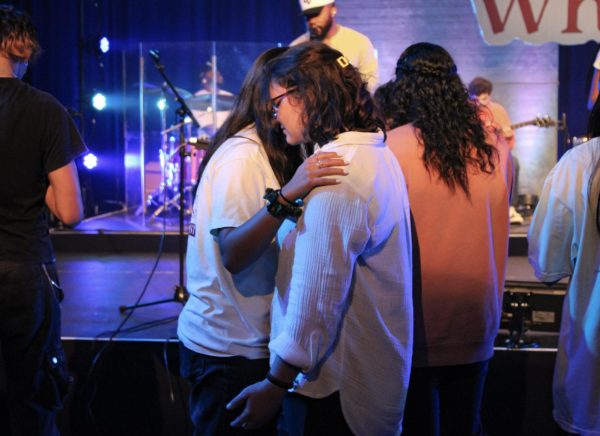
DAY THREE: REFLECTION AND RESPONSE WITH MIKE AHN
During the final session, Mike Ahn and Biola’s other Spiritual Development leaders guided students through a thoughtful time of reflection, prayer and conversation with one another.
The session opened with a time of worship, followed by Mike Ahn’s overview of Rebecca McLaughlin’s “Four Things Christians Must Reclaim.” Ahn invited students to discuss which one of those they felt God was calling them to ponder more about.
Chad Miller discussed Rachel Gilson’s “The Gospel and Same-Sex Attraction.” He invited students to think more diversely about relationships in their lives and consider the value of brotherly and sisterly love. Students pondered about the role of sexuality in their lives and how over-emphasizing the importance of sexuality can be a roadblock to discipleship.
Megan Ashor summarized Trip Lee’s testimony about his struggle with chronic fatigue. She asked students to reflect on how we often ask God to simply remove suffering from our lives when suffering is rather meant to form who we are and strengthen our faith in God.
Landon White reviewed the panel with the Winsome Conviction Project. He highlighted the diverse perspectives and voices during the session, and how students can use these experiences to guide them through difficult conversations. White encouraged students to think about people in their lives who embrace them and how we can show compassion towards those with opposing viewpoints.
The last session closed with a time of prayer and musical worship.
Torrey Conference 2024: Wholehearted ended on a sunny Friday morning. Having delved into topics on grief, conflict, sexuality and more, students will continue to reflect upon these in their own lives and how they might worship God with all their being — just as Psalm 86:11 says: “Teach me your way, LORD, that I may rely on your faithfulness; give me an undivided heart, that I may fear your name.”
